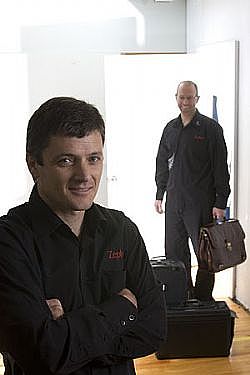Tags, tickets and new markets
Premier Business Print is a company going places with its highly specialised printed products. Editor Glenn Baker backgrounds its success.
The average person in the street has probably never heard of Premier Business Print.
But there’s a good chance you came into contact with the company’s products today and weren’t even aware of it.
Remember that Wilson Parking ticket you fed into the machine? Or that consignment note you wrote? How about those invoices you handled, the packing slips, purchase orders, receipts or cheque remittance? Then there are all those supermarket and retail store receipts in your wallet or handbag, and those ATM receipts. The list goes on and on – everything from business cards to brochures, booklets to swing tags, courier tickets to price labels – indeed all kinds of labels. Oh, and that airline ticket, departure tax receipt and boarding pass? That’s right – all handled by Premier Business Print.
Premier Business Print is a quiet achiever in its niche market. Keith and Lorna Coleman began the company in 1983 and have quietly gone about growing the company ever since; always innovating and constantly adapting to changing market demands.
In the early days, the core business was forms printing – but the company has long since diversified into specialised ‘critical business print’ solutions. Today it has offices in Auckland, Wellington, Melbourne and Sydney and occupies a commanding position in the roll product, tags and labels market, as well as the provision of print management services.
A large number of firms on both sides of the Tasman have come to rely on Premier Business Print’s commitment to producing precise, quality products. The many awards hanging from the walls at the East Tamaki head office are testimony to the company’s high standards. But considering the vital nature of their output, high standards are paramount. As Andrew Perrier, Premier’s sales and marketing manager points out, the products they manufacture are indeed critical to their clients’ supply chains.
Offshore expansion
In 2007, and with its 25th anniversary less than 12 months away, the company is poised for growth in export markets – particularly Australia and the US.
The watershed for much of this recent growth has been Premier’s accreditation as the only certified partner for Skidata parking ticket technology outside Europe.
(Based in Salzburg, Austria, Skidata is one of the world leaders in parking ticket technology).
Wilson Parking, through its integrated parking services subsidiary Wilson Technology Solutions, operates Skidata car park technology in New Zealand, Australia and the Asia-Pacific region. Skidata is also associated with 750 parking sites throughout the US.
You’d think you would have to print truck-loads of tickets to make a buck, but this commitment to Skidata technology represents $1 million in sales to the company per year based on Australia and New Zealand sales alone.
Premier has the domestic car park ticket market pretty much sewn up at 95 percent; it is a major exporter to Australia (currently around 20 percent of turnover), and more importantly from an export perspective, it is now accredited with Skidata in the US. The targeted ticket market in North America is around three times the size of Australia and New Zealand combined and is expected to boost annual turnover by some $3 million.
According to Perrier the first sales into the US will happen this year, but like most exporters to the US, they’ll be much more comfortable with that deal when the exchange rate with the US dollar improves. They’re not alone in their concerns over the high Kiwi.
Perrier is excited about the future of Premier Business Print – it has geared up specifically to meet the needs of its customers and their desire for precise, accurate ticketing products. Recent investments include a fanfold finisher – the only one of its type in Australasia (to meet the demands of the local car park ticket market) – and a Scitex high-speed, high quality, variable data printer; the only one of its kind in the country and acquired to meet the specific demand for precision, customised printing.
Machines that read barcodes have very fine tolerances, and companies such as Wilson Parking cannot afford to run inferior ticketing products and run the risk of voiding the warranty on their equipment.
Perrier sees a great deal of potential in the thermal rolls market too; driving sales is the increased demand for EFTPOS receipting and the recent trend for printing ‘call to action’ offers, terms of conditions or branding on the reverse side of receipts.
And while many New Zealand manufacturers are coming under attack from Asian-based competitors, he doesn’t see this as a real threat.
“We’re a very specialised manufacturer and extremely flexible – low volume runs, for example, are not a problem,” he says. “We’re also very price competitive – for example we can manufacture and deliver our thermal roll products at the same price, if not cheaper than, Asian factories. The difference is we only print on high quality paper and our product is of a consistently high standard – it just can’t be any
other way.”
Success factors
While not one for complacency, Perrier believes Premier Business Print has a commanding market position and he puts their success down to five factors.
Firstly it’s about experience. “Between our Auckland and Wellington plants there are 300 years of combined business print experience,” says Perrier.
Secondly, it’s about strong customer relationships. “Most of our business is repeat business – customers are looking for reliability and consistency, so if there’s a potential problem we will sort it out. It’s not just about price either – these are largely technical products that simply have to work every time.”
The third factor is that from a disaster recovery point of view having two plants is a major advantage. “We believe we have all the ‘what ifs’ covered,” adds Perrier. “And this extends to supply – we’ll move heaven and earth to see that a customer does not run out of stock.”
The final two factors are the company’s dedication to quality, and manufacturing diversity. “Jobs that would otherwise end up in the ‘too-hard basket’ of our major competitors are passed on to us for processing,” says Perrier.
This kind of ‘can-do’ attitude is typical of many New Zealand businesses, and is one that will see Premier Business Print successful in offshore markets for many years to come. NZB
For more about the company visit www.premier.co.nz



